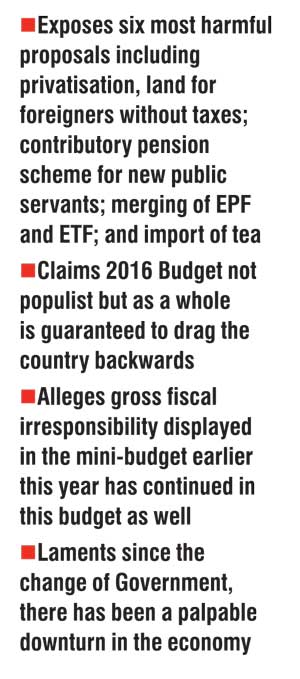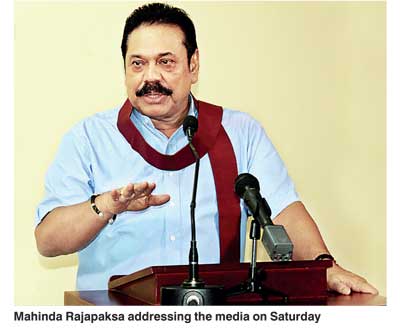Tuesday Feb 17, 2026
Tuesday Feb 17, 2026
Monday, 30 November 2015 00:00 - - {{hitsCtrl.values.hits}}
 Former President Mahinda Rajapaksa on Saturday criticised the Unity Government over its maiden Budget saying it was full of catastrophic proposals that would destroy the economy whilst claims of higher expenditure on education were not true either.
Former President Mahinda Rajapaksa on Saturday criticised the Unity Government over its maiden Budget saying it was full of catastrophic proposals that would destroy the economy whilst claims of higher expenditure on education were not true either.
Expressing his views at a media conference held at the Narahenpita Abayarama, Rajapaksa listed six specific proposals which in his opinion were “most harmful”.
Rajapaksa said that despite an attempt to create an impression of a populist budget with reductions in the price of gas and several foodstuffs and lower income tax rates, “the budget as a whole is guaranteed to drag the country backwards.” “The Achilles heel of this Government is fiscal and external sector management, which has placed the entire country on a ticking fiscal and balance-of-payments time bomb,” warned the former President.
“The gross fiscal irresponsibility displayed in the mini-budget earlier this year has continued in this budget as well,” he charged.
Rajapaksa alleged that since the change of Government there has been a palpable downturn in the economy. He also said that no responsible Government would project a near 40% increase in tax revenue. “The projected 300% increase in non-tax revenue in 2016 is obviously from the sale of the earmarked government-owned entities which means there will be a sharp increase in non-tax revenue in 2016 and virtually nothing thereafter,” claimed Rajapaksa.
“While the Budget provides extensive concessions to foreigners, it places considerable burdens on the ordinary people,” former President said adding that he was totally opposed to the proposal to allow land to be given on long leases to foreigners without the taxes.
“No true member of the SLFP or progressive UPFA member can support this unbridled liberalism that makes our nations dependent on the West for survival,” Rajapaksa said.
During the press conference former President said he was totally opposed to privatisation of profitable state enterprises saying the present Government was “insatiable thirst for quick cash”.
“Foremost among the budget proposals that I am unable to agree with is the sweeping program of privatisation,” he said. “I wish to remind this government that the people of this country have not given their approval for any privatisation of these assets and on that basis, I wish to caution possible acquirers of such state assets, that a future government will not hesitate to vest the ownership of such assets in the people once again,” warmed Rajapaksa.
He is also opposed to bringing new recruits to the government service under a contributory pension scheme from 2016 onwards. “The pension is a privilege that the government servants enjoy and it should continue. My Government wanted to create a completely new contributory pension fund for private sector workers, but without amalgamating or in any way touching the existing EPF or ETF,” said Rajapaksa.
Opposing the proposal to liberalise the import of cheap tea to be blended and re-exported, the former President said: “This will cause an immediate decline in the demand for locally produced tea. Hundreds and thousands of small holders and estate workers depend on the production of tea in this country.”
On the other hand he said solutions have to be found for problems like the high cost of production and low productivity without destroying the tea industry.
“I am also opposed to the phasing out of the fertiliser subsidy and the free school uniforms by issuing vouchers and giving cash grants instead of the fertiliser and the cloth,” Rajapaksa said noting both these could be categorised as production subsidies. “These are not consumption subsidies. The fertiliser subsidy had a lot to do with making the country self sufficient in rice,” Rajapaksa added.
Focusing on expenditure proposals, the former President said: “It is with profound disappointment that I also note the fraudulent manner by which the Government has tried to convey the impression of increased spending on education.”
He said that although Rs. 186 billion has been allocated for education in 2016, two-thirds of this amount is taken up by just one item - Capital Carrying Cost of Government Lands & Buildings - which means the year’s value of the government buildings and lands used for education. He said one cannot consider the present value of what had been built with past allocations to be an ‘expenditure’ item for the coming year.
See former President’s full comments on 2016 Budget on Page 2.